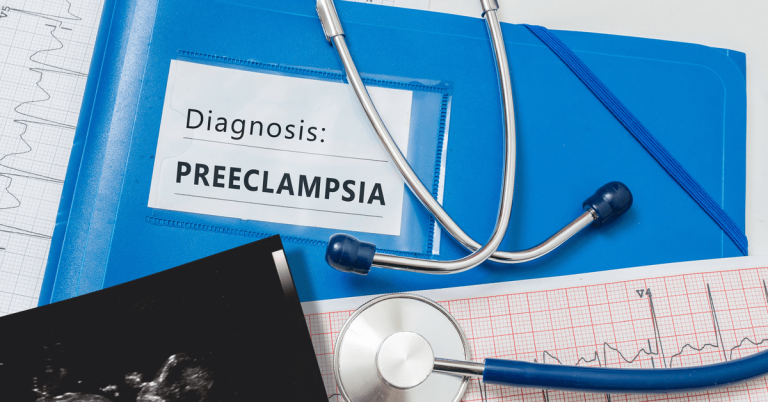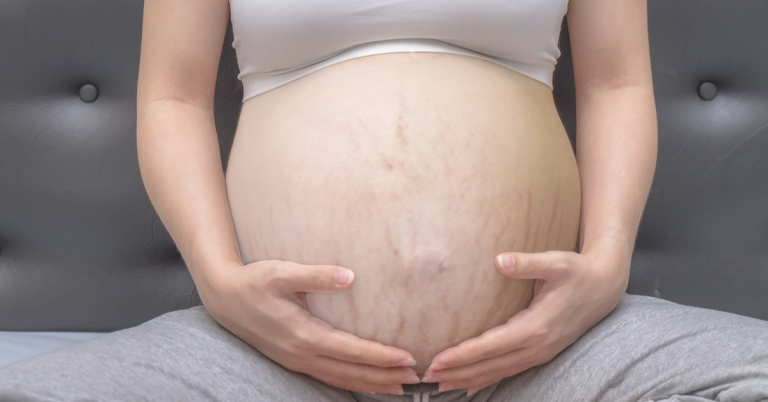You may not realise it yet, and you will only learn this wonderful news in two to three weeks, but your body is preparing for pregnancy!
This may be a bit odd, but the date of gestation is calculated from the start of a new cycle, which is the first day of your menstruation. This is the day your body starts preparing for a possible pregnancy. The first two weeks of pregnancy cover the period from when a new egg begins to mature until the day of ovulation and fertilisation. So, what happens during these first two weeks of this incredible adventure, which will last approximately 40 weeks?
Week One of Pregnancy
During the first two weeks of gestation, there’s no baby yet, but we can examine the events leading up to this wonderful adventure. Your oestrogen and progesterone levels increase, which stimulates your uterus. The uterus forms a strong, thick lining which is the ideal environment for the implantation of a fertilised egg. At the same time, the egg (the female reproductive cell) begins to mature in the follicle of the ovaries. The mature egg leaves the follicle at ovulation and moves towards the fallopian tube.
When there is sexual intercourse at the right moment, sperm cells may pass through the cervix, enter the uterus, and eventually reach the fallopian tube to meet the egg. From the millions of sperm cells, only one, the strongest and healthiest, will survive this journey and be able to pierce the egg membrane and enter! Within 30 hours, the sperm penetrates the egg membrane, and the nuclei of the sperm and egg cells unite. This is the moment of fertilisation. The genetic information of the mother and father merge, giving the baby characteristics of both parents.
The sex of the baby is determined at the moment of fertilisation. If the sperm reaching the egg carries the Y chromosome, the baby will be a boy. If it has the X chromosome, it will be a girl. Although this is determined from the start, you will probably only get to know your baby’s gender after week 16.
The fertilised egg is called a zygote and takes 3-4 days to travel to the uterus. In the meantime, it undergoes cell divisions, increasing the number of cells. This clump of cells is called the blastocyst, which prepares to settle in the mother’s womb. In the future, the blastocyst will form both the placenta and embryo.
Your Body During the First Two Weeks of Pregnancy
At the beginning of her cycle, a woman’s reproductive organs undergo several important changes. The thickening of the uterine lining, called the endometrium, the maturation of the egg in the follicle, etc. Different hormones play a role:
- Follicle Stimulating Hormone (FSH):
This hormone, secreted from puberty, stimulates the eggs to mature and the follicles to grow in the ovaries.
- Luteinising Hormone (LH):
The LH is involved in sexual functions and reproduction. Its levels rise quickly just before ovulation. It is very important for pregnancy as it stimulates the ovaries and causes the follicle to release the egg. LH also regulates the release of oestrogen and progesterone.
- Oestrogen:
Oestrogen stimulates the embryo to attach to the uterus during early pregnancy. It is active from the beginning of the menstrual cycle throughout pregnancy.
- Beta HCG (human chorionic gonadotropin):
You can find out whether you are pregnant thanks to this hormone. HCG is secreted by the cells surrounding the newly fertilised egg and rises when the embryo settles in the womb. It is also the main cause of pregnancy nausea or morning sickness often experienced during the first three months.
- Progesterone:
The main task of progesterone, whose level rises immediately after ovulation, is to help build the uterine lining into which the fertilised egg is implanted. In other words, progesterone carefully prepares the uterine wall for embryo development. In doing so, it gets help from the oestrogen hormone.
Pregnancy Symptoms
The most obvious early pregnancy symptom is delayed menstruation, but this doesn’t become clear until the fourth week. Pregnancy symptoms occur from the moment of fertilisation but may not become obvious until the third or fourth week. However, some women experience clear pregnancy symptoms immediately after fertilisation. Possible symptoms are:
- Mild Bleeding and Discharge
Light bleeding or pale red discharge is possible when the embryo is implanted. Unlike menstrual bleeding, it comes at irregular intervals and is light in colour. Rarely, this bleeding can also be experienced as a heavy discharge in early pregnancy.
- Groin Pain
Cramps and groin pain may occur as the uterus prepares for the baby.
- Breast Sensitivity
The swelling of the breasts will become more obvious later, but it is often also one of the earliest pregnancy symptoms. The breasts feel tender and slightly painful when touched.
- Weakness and Fatigue
Progesterone, which sharply increases with pregnancy, can cause a pregnant woman to feel tired. Fatigue and weakness can be among the first pregnancy symptoms. It is normal because your body is busy growing your baby right now.
- Morning Sickness and Vomiting
The increase in Beta HCG and oestrogen may cause morning sickness and vomiting at the beginning of pregnancy. It may manifest immediately after fertilisation in week 2.
What You Need to Know About the Ovulation Period
Ovulation occurs each menstrual cycle in women, from puberty to menopause, and usually happens 12 to 16 days before the start of the next period. During ovulation, the follicle releases the egg into the fallopian tubes. If, after sexual intercourse, the egg in the fallopian tubes meets a sperm cell – the male reproductive cell – fertilisation occurs. This triggers the release of different hormones that prepare the woman for pregnancy.
If you are trying to conceive, it is important to know when you are ovulating, as the life of the egg cell is short-lived. Therefore, it is important to understand this process well.
- As you get closer to ovulation, the body produces increased oestrogen levels, which causes the uterine lining to thicken, which forms a sperm-friendly environment.
- High oestrogen levels also trigger a spike in the luteinising hormone (LH), which causes the mature egg to be released from the ovarian follicle.
- Ovulation normally occurs 24 to 36 hours after the LH surge, indicating a fertility peak. Ovulation tests measure exactly this and indicate when you are ovulating.
- If your average menstrual cycle is 28 days, you are expected to ovulate on the 14th day after your last period.
- If you are trying to conceive, the best time to have sexual intercourse starts 72 hours before and ends 24 hours after ovulation.
- The egg must be fertilised within 24 hours after ovulation.
- If fertilisation does not occur within 24 hours after ovulation, the egg is expelled from the body, together with the thick uterine lining that prepared the uterus for pregnancy. But there is no need to despair. In another 14 days, there will be another ovulation.
Things to Consider When Trying to Conceive
Careful monitoring
If you are trying to conceive, you should carefully monitor your menstrual cycle and ovulation. You should also have regular sexual intercourse, especially around the time of your ovulation.
Take a Folic Acid Supplement
Experts recommend that all women trying to conceive take a daily folic acid supplement. Folic acid reduces the risk of neural tube defects in the baby, and this defect occurs during the first weeks of pregnancy. It is a rare condition in which the foetus’ spinal cord and brain structure do not form properly. In addition, folic acid helps ensure a healthy reproductive balance. If you are considering getting pregnant, you can consult your doctor about taking a folic acid supplement. Your doctor will help you determine the dose. If your pregnancy is unexpected, likely, you are not taking a folic acid supplement. But don’t worry; you can make up for a possible deficiency when you carefully take this supplement during the first 12 weeks of pregnancy.
Stop Smoking and Drinking Alcohol
If you smoke, you need to give up this harmful habit as soon as you are trying to conceive. Smoking is detrimental to both you and your baby. It causes premature birth, low birth weight, respiratory issues, and increases the risks of a miscarriage. The smoking cessation rule also applies to aspiring fathers. This unhealthy habit seriously reduces the number and quality of sperm in men, which negatively impacts the chances of getting pregnant. Even if you don’t smoke, passive smoking is also harmful. Ask your spouse, friends, and family not to smoke near you. Couples trying to conceive should also try to avoid drinking much alcohol and taking drugs or other addictive substances as they lower fertility. If you are pregnant and continue these harmful habits, you should know that these substances will also harm your baby.
Keep Your Weight Under Control
Being overweight or underweight affects ovarian function and ovulation. Weight problems also complicate fertility treatments. Therefore, maintaining a healthy weight with a healthy diet and regular exercise is key.
Be Sensible About Medication Use
Certain medications negatively impact ovulation and fertility. Therefore, carefully research the drugs you use or plan to use. Never use any medications without consulting your doctor.
Eat a Healthy Diet
Eating an unhealthy diet leads to nutrient deficiencies. In its turn, this reduces the chances of getting pregnant. In particular, you must maintain the vitamin and mineral balance of your body. According to experts, B vitamins, magnesium, and zinc increase fertility. So, if you are trying to conceive, eating a diet rich in these nutrients is important. The most effective fertility-increasing foods are walnuts, hazelnuts, and leafy greens, as they are rich in magnesium. Red meat, poultry, shellfish, and dairy products help you get the zinc you need. Garlic contains a lot of vitamin B, lentils are a rich source of folic acid, and eggs are a strong protein hero. Together, they form the A-team when it comes to pregnancy and fertility.
Reduce Your Stress Level
Typical, daily stress may not hinder conception, but high levels of stress, combined with the pressure of trying to conceive, may negatively affect fertility. Eating a regular and healthy diet, exercising, and getting enough sleep can help you fight stress.
Calculating the Period of Gestation
Calculating your gestation may be confusing, as it is counted from the first day of your last menstruation. At that moment, of course, you were not pregnant yet, but your body was preparing for pregnancy. The actual pregnancy starts at the end of the second week, after ovulation and fertilisation. Once your doctor confirms you are pregnant, he will help calculate your gestation, allowing you to monitor your pregnancy carefully. Our Week-by-Week Pregnancy guide will help you with this.
Share your ideas on this topic in the comments.







